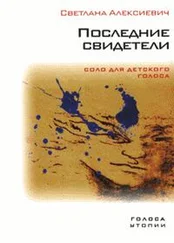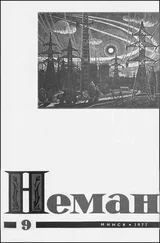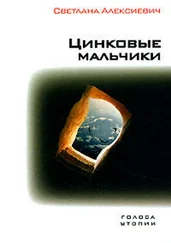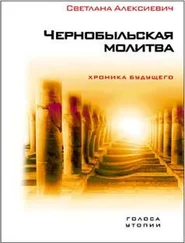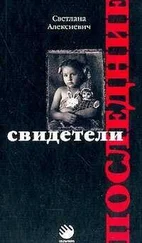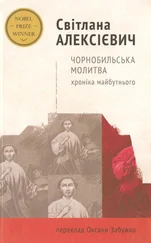Светлана Алексиевич - Chernobyl Prayer - A Chronicle of the Future
Здесь есть возможность читать онлайн «Светлана Алексиевич - Chernobyl Prayer - A Chronicle of the Future» весь текст электронной книги совершенно бесплатно (целиком полную версию без сокращений). В некоторых случаях можно слушать аудио, скачать через торрент в формате fb2 и присутствует краткое содержание. Год выпуска: 2016, ISBN: 2016, Издательство: Penguin Books Ltd, Жанр: Биографии и Мемуары, на английском языке. Описание произведения, (предисловие) а так же отзывы посетителей доступны на портале библиотеки ЛибКат.
- Название:Chernobyl Prayer: A Chronicle of the Future
- Автор:
- Издательство:Penguin Books Ltd
- Жанр:
- Год:2016
- ISBN:9780241270547
- Рейтинг книги:3 / 5. Голосов: 1
-
Избранное:Добавить в избранное
- Отзывы:
-
Ваша оценка:
- 60
- 1
- 2
- 3
- 4
- 5
Chernobyl Prayer: A Chronicle of the Future: краткое содержание, описание и аннотация
Предлагаем к чтению аннотацию, описание, краткое содержание или предисловие (зависит от того, что написал сам автор книги «Chernobyl Prayer: A Chronicle of the Future»). Если вы не нашли необходимую информацию о книге — напишите в комментариях, мы постараемся отыскать её.
Chernobyl Prayer: A Chronicle of the Future — читать онлайн бесплатно полную книгу (весь текст) целиком
Ниже представлен текст книги, разбитый по страницам. Система сохранения места последней прочитанной страницы, позволяет с удобством читать онлайн бесплатно книгу «Chernobyl Prayer: A Chronicle of the Future», без необходимости каждый раз заново искать на чём Вы остановились. Поставьте закладку, и сможете в любой момент перейти на страницу, на которой закончили чтение.
Интервал:
Закладка:
I remember the seaside. He and I went to the seaside. What I remember is that there was just as much sea as there was sky. My friend and her husband … They came with us too. She remembers: ‘The sea was dirty. Everyone was afraid of getting cholera.’ The newspapers had been writing something about it. I remember it differently. In very vivid colours. I remember the sea was everywhere, and so was the sky. Such a deep, deep blue. And him there beside me. I was born to love, to be happy in love. At school, all the girls had ambitions. Some wanted to go to college, some to go away on a Young Communist League construction project, but I just wanted to get married. To love incredibly, as passionately as Natasha Rostova in War and Peace . Just to love someone! Only I couldn’t admit it to anyone, because at that time, you must remember, the only permissible dreams were of going to work on a YCL project. We had that drummed into us. People were desperate to go to Siberia, into the impenetrable forests of the taiga . Do you remember, we used to sing, ‘for the mists and for the smell of the taiga’? I didn’t manage to get into college at my first attempt. I didn’t have enough credits, so I went to work at the telephone exchange. That’s where we met. I was on duty. I got him to marry me. I said to him, ‘Marry me. I love you so much!’ I was head over heels in love. He was so handsome. I was flying in the sky. I asked him myself: ‘Marry me!’ ( Smiles .)
At times, I think about things and try to comfort myself in different ways: perhaps death is not the end, and he has just changed and is living somewhere in a different world. Somewhere near me. I work in a library, read a lot of books, meet all sorts of people. I would like to talk about death. To understand. I’m looking for consolation. I find things in the newspapers and in books. I go to the theatre if there’s something on there about it, about death. I am physically in pain without him, I can’t live on my own …
He didn’t want to go to the doctor: ‘I don’t feel anything. I’m not in pain.’ By now, his lymph nodes were the size of hens’ eggs. I had to push him into the car by force and drive him to the clinic. They referred us to a cancer specialist. One doctor looked at him and called another: ‘I’ve got one more here from Chernobyl.’ They kept him in the hospital. A week later they operated: they completely removed his thyroid gland and larynx and replaced them with a lot of tubes. Yes … ( Trails off .) Yes. Now I know that was still a happy time. Lord! What silly things I was doing, running round the shops, buying presents for the doctors: boxes of chocolates, imported liqueurs. Bars of chocolate for the nurses. And they took them. He laughed at me: ‘Sweetheart, they’re not gods. The chemotherapy and radiation treatment aren’t in short supply. They’ll give it without expecting chocolates.’ But I rushed to the outskirts of the city to get a chocolate and marshmallow cake, or some French perfume. At that time, you could get these things only if you knew someone. It all came from under the counter. That was before they discharged him to come home. We … We were coming home! I was given a special syringe and shown how to use it. I had to feed him with it. I learned all that. Four times a day, I cooked something fresh, fresh every time. I ground it up in a mincer, rubbed it through a strainer, and then sucked it up into the syringe. I pierced one of the tubes, the biggest one, and it went into his stomach. But he lost his sense of smell, he couldn’t tell one food from another. I would ask, ‘Do you like that?’ but he didn’t know.
In spite of everything, we still managed to get out a few times to the cinema. We would kiss in there. We were hanging by such a very thin thread, but it seemed to us we were managing to hold on to life. We tried not to talk about Chernobyl, never to remember it. It was a taboo subject. I wouldn’t let him near the phone. I intercepted it. His lads were dying, one after another. It was taboo … But then one morning I woke him, gave him his dressing gown, and he couldn’t get up. He couldn’t say anything either. He’d stopped talking. His eyes were ever so big. That’s when he got really frightened. Yes … ( Trails off again .) He stayed with us for another year. All that year, he was dying. Every day, he got worse and worse, and he knew his mates were dying too. That was something else we had to live with, that waiting. They talk about Chernobyl, they write about it, but nobody knows what it’s like. Everything here is different now. We aren’t born the same, we don’t die the same way. Not like everybody else. Ask me how people die after Chernobyl! The man I loved, loved so much that I couldn’t have loved him more if I had given birth to him, turned in front of my eyes into a monster.
They took out his lymph nodes, and that affected his circulation. His nose got somehow out of place and three times bigger, and his eyes weren’t the same any more. They moved in opposite directions. There was a different light in them, one I didn’t know, and an expression as if it wasn’t him looking out of them but someone else. Then one eye closed completely. And what was I really afraid of? I just didn’t want him to see himself, to have to remember what he looked like. But he began asking me, showing me with his hands that he wanted me to bring him a mirror. Sometimes I would run out to the kitchen, pretending to have forgotten, or I would come up with something else. I played those tricks on him for two days, and on the third day he wrote in large letters in his notebook, with three exclamation marks, ‘Give me a mirror!!!’ We already had a notebook, a pen, a pencil, that was how we communicated now because he couldn’t speak even in a whisper, he couldn’t even manage a whisper. He was completely mute. I ran to the kitchen, rattling saucepans about. I hadn’t read it! I hadn’t heard! Again, he wrote: ‘Give me a mirror!!!’ again with all those exclamation marks. I brought him a mirror, the smallest I could find. He looked in it, clutched his head and rocked and rocked on the bed. I went to him and wanted to talk him round. ‘When you’re a bit better we’ll go and live in some abandoned village. We’ll buy a house and live there, if you don’t want to live in the city with a lot of people. We’ll live alone.’ I meant it. I would have gone anywhere with him, just so long as he stayed alive, and what he looked like didn’t matter. I just wanted him. I meant it.
I won’t mention anything I don’t want to talk about. There were such things … I saw terrible things, perhaps more terrible than death. ( She stops .)
I was sixteen when we met. He was seven years older than me. We were seeing each other for two years. I really love the area here in Minsk around the main post office, Volodarsky Street. He used to meet me there, under the clock. I lived near the worsted mill and took the No. 5 trolleybus. It didn’t stop at the post office, but a bit past it, near the children’s clothes store. It slowed down before the turn, which was just what I wanted. I was always a little bit late, so I could look out the window and gasp when I saw how handsome the man waiting for me was! For those two years, I was in a world of my own. I wouldn’t have known whether it was winter or summer. He took me to concerts, to see my favourite singer, Édith Piecha. We didn’t go running off to dances, because he couldn’t dance. We used to kiss, only kiss. He called me ‘my little girl’. On my birthday … again my birthday … It’s strange, all the most important things in my life seem to have happened on that day, so I won’t let anyone tell me they don’t believe in fate. I was standing under the clock. We had a date to meet at five, but he wasn’t there. At six, terribly upset, in tears, I wandered back to my bus stop. I was crossing the street, when my sixth sense told me to look round. He was running after me, despite the red light on the crossing, in his boiler suit and boots … They wouldn’t let him off work any earlier. I really loved the way he looked then. In camouflage fatigues, in a quilted bodywarmer – everything suited him. I went home with him and he changed his clothes. We decided to celebrate my birthday in a restaurant, but couldn’t get in. It was already too late in the evening, there were no seats left, and neither of us could afford to slip five or ten roubles (in the old currency) to the man on the door, like other people did. ‘Come on!’ he said, suddenly beaming. ‘Let’s buy some champagne and cakes and go to the park. We’ll celebrate your birthday there.’ Under the stars, under the sky! That’s the kind of man he was. We sat on a bench in Gorky Park until morning. I never had another birthday like it in my life. That’s when I said to him, ‘Marry me. I love you so much!’ He laughed and said, ‘You’re still little.’ But the next day, we took our application to the registry office …
Читать дальшеИнтервал:
Закладка:
Похожие книги на «Chernobyl Prayer: A Chronicle of the Future»
Представляем Вашему вниманию похожие книги на «Chernobyl Prayer: A Chronicle of the Future» списком для выбора. Мы отобрали схожую по названию и смыслу литературу в надежде предоставить читателям больше вариантов отыскать новые, интересные, ещё непрочитанные произведения.
Обсуждение, отзывы о книге «Chernobyl Prayer: A Chronicle of the Future» и просто собственные мнения читателей. Оставьте ваши комментарии, напишите, что Вы думаете о произведении, его смысле или главных героях. Укажите что конкретно понравилось, а что нет, и почему Вы так считаете.

